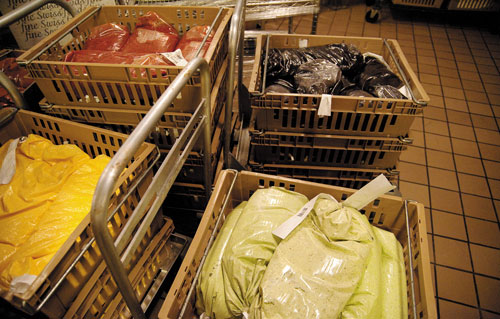Almost exactly a year ago, I wrote a column about the vegetarian food options in the residential dining halls and restaurants. I won’t go into the details (you can check it out on our website), but let’s just say it wasn’t the most flattering piece. As a vegetarian, I struggled to order a sandwich at Bruin Café (because there wasn’t a vegetarian one), the salad bars were mediocre, and there just wasn’t much variety.
Things have definitely changed.
On the same day the column was published, I was contacted by UCLA’s Director of Food and Beverage, Daryl Ansel, who told me he wished to meet to discuss my ideas. I have to admit, I was a little intimidated ““ after all, I’d just bashed one of the best college dining halls in the country ““ but agreed to meet him and Corporate Chef Roger Pigozzi for dinner at Hedrick Hall. To my dismay, Ansel pulled out a copy of my column, highlighted in multiple areas.
But I soon found that they were far from upset. In fact, the evening turned out to be a sort of taste-testing session in which we all tried and commented on the vegetarian foods served that night. They agreed that the microwaved veggie burger patty was subpar, the orange tofu was too sweet, and the gumbo could be better spiced.
When I decided to become a vegetarian seven years ago, I didn’t think it would always be smooth sailing. Saving 100 animals a year, I figured, would require constant vigilance, saying “no” to tantalizing temptations, and being generally less satisfied at mealtime. Thanks to numerous improvements, I’ve now found that sticking to a vegetarian diet at UCLA is pretty much as painless as it gets.
The most noticeable change for vegetarians and vegans has been the salad bar. De Neve’s and Covel’s salad bars have some valuable additions: Both now have pasta and pesto on a regular basis, and both have better ingredients (including vegan chicken and vegan beef) as well as a whole host of dressings (including one of my new favorites, “Sweet Thai”).
De Neve also offers bruschetta and tasty toppings such as wasabi peas, coconut and almonds. And it has the best assortment of fruit ““ strawberries, pineapple, cantaloupe, honeydew and sliced green apples with caramel.
Recently, the dining team has been particularly focused on offering vegan items. In honor of Earth Day, Ansel and 14 other members of the staff even agreed to go completely vegan for a week. The only way to get vegans’ perspective, Ansel said, “was to walk a mile in their shoes.” Ansel focused on educating the staff and sent out an e-mail about the numerous benefits of veganism.
Besides saving animals, eating less meat means putting less strain on both the environment and on our bodies. According to the Environmental Protection Agency, chemical and animal waste runoff from factory farms accounts for more than 173,000 miles of polluted rivers and streams. The agency also estimates that almost 95 percent of the pesticide residue in the average American diet comes from meat, fish and dairy products.
Dining services’ commitment to improving vegan foods was evident in the period before Café 1919 opened. A few members of Bruins for Animals and I were invited to a taste-testing session for the items they had developed. We were pleasantly surprised to find that they had already implemented one of the group’s suggestions for using Daiya vegan cheese, an imitation that is particularly convincing.
Late Night, too, now has a vegan dish. While not the healthiest thing, the vegan “chicken” fingers are downright delicious. These deep-fried, breaded soy strips come with vegan ranch dressing or barbecue sauce and a side of fries or onion rings. According to Ansel, these sell so well that “it’s clearly not just vegans eating it.”
Bruin Café has a few new perks as well; it now offers a refreshing new salad made with fruits and nuts as well as a rotating “Soup of the Day,” which means you can sometimes get carrot dill soup (my personal favorite), or even corn chowder. And as for that sandwich ““ Bruin Café will soon have a vegan barbecue sandwich which I am greatly anticipating.
These improvements by no means came about on their own; they involved numerous efforts from the dining staff. Serving 20,000 to 25,000 meals a day in multiple locations is hard enough. Developing specialized options is even harder.
“It wasn’t a walk in the park,” Pigozzi said. The team still faces challenges in providing vegan alternatives ““ for instance, remaining within the limits of its budget. Unfortunately, soy products are still more expensive than meat ones, though they cost less to produce.
Take advantage of what the dining halls have to offer and go meatless for a change. Don’t be afraid to leave your own suggestions on the dining website, either. One thing’s for sure: UCLA dining ““ literally ““ caters to students.
Hungry? E-mail Nijhawan at anijhawan@media.ucla.edu. Send general comments to viewpoint@media.ucla.edu.

Yay!!! Vegan options still so far away from campus though!!! There should be an hourly delivery service for those of students who want to stay on campus to study!